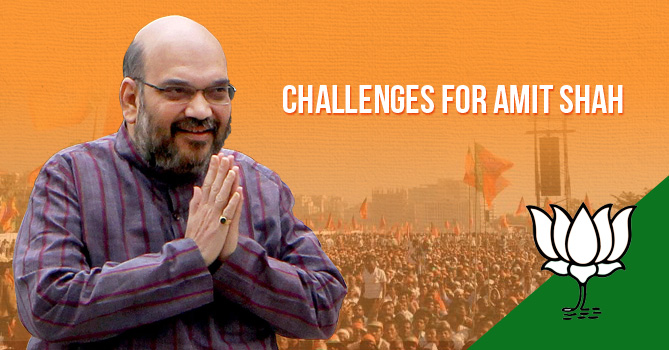January 24, 2016, will always be an important milestone for Amit Shah as he got re-elected for the second time as the BJP President. His re-election signifies the faith the party places on his experience and ability to steer the party’s political future through the next general elections. So who really is Amit Shah and does he really justify the faith his party has placed in him?
Amit Shah – the Man
Amit Shah was born on 22 October 1964 in Mumbai. His early years were spent in Mehsana and Ahmedabad, where he completed his B.Sc. in Biochemistry. At a young age, Amit Shah was exposed to the RSS ideology and has been an active volunteer for the organization.
He first met Narendra Modi in 1982 during his RSS Pracharak days. In 1983, he joined ABVP and soon became an active student leader. He joined BJP in 1986 and ever since has remained a loyal party worker. It was Narendra Modi who first proposed his name for a party ticket to stand from Sarkhej, a constituency that he nurtured and from where he won four consecutive assembly elections since 1997.
In 2010, he was embroiled in a major controversy over the killing of Sohrabuddin and his associates in Gujarat. His big political break came when he was entrusted by the party to oversee elections in India’s most politically important state, U.P, during the 2014 General Elections. The party won 73 out of 80 seats under his watch.
In July 2014, he was elected BJP President for the first time and ever since he has tirelessly worked as the party’s principle strategic planner.
BJP’s victories under Amit Shah’s leadership
2014 General Election result in Uttar Pradesh
Amit Shah has demonstrated his mettle as a canny political strategist who seems to have his ear to the ground. He first showed his political skills when he took over the party reins in U.P, at a time when BJP had little chance in the state. Samajwadi Party was strongly entrenched in the state and most did not expect Amit Shah to deliver 73 seats out of 80. That win announced Amit Shah’s arrival in BJP’s national politics.
Agreed, that his efforts were strengthened by the Modi phenomenon that hit the country, but his work in motivating party cadres in the state remains a personal highlight.
2014 Maharashtra Assembly elections
He followed up on his U.P. efforts by winning in Maharashtra. The sheer combination of strong leadership of Amit Shah and charisma of Narendra Modi ensured that BJP rode to power winning 122 out of 288 seats. Shiv Sena, its closest rival and now alliance partner, could garner only 63 seats, while INC bagged 42 and NCP 41. It was on Amit Shah’s recommendation that Devendra Fadnavis got elected as the CM of Maharashtra.
2014 Haryana Assembly elections
Haryana was a crucial state and very critical to BJP’s plans to make inroads into other states going forward. With anti-incumbency working against the Hooda-led INC government, it was Amit Shah who engineered his party cadres to ensure that the party ended up with 47 out of a total of 90 seats, decimating the ruling Congress and strongly establishing BJP as a resurgent party to contend with.
2014 Jharkhand Assembly elections
Jharkhand assembly elections was important for the BJP as it was for the first time that the party was trying to get a strong foothold in the Eastern state. It was also crucial as a win here could have positive implications to the party’s efforts in Bihar in 2015. Amit Shah rallied his forces in bringing his party to power in Jharkhand, where BJP ended up winning 37 out of 81 assembly seats. It took a lot of political wrangling and deft handling to pacify various elements within the party and outside to support his choice of CM.
2014 J&K Assembly elections
J&K has been a major challenge for the party. Given the bull run through most of 2014 riding the Modi wave, much was expected from the J&K elections where the BJP was never a serious contender. The 2014 assembly elections offered serious hope for the first time where an alternate to the usual INC, NC and PDP was expected. The BJP won 25 out of 87 seats, while PDP got 28.
Although, the result did not give majority to the BJP, it was the party’s best performance in the state till date. The government was formed in alliance with the PDP and Amit Shah can take credit once again for his efforts in gaining a foothold in a tough state.
Major setbacks under Amit Shah
2015 Delhi Assembly elections
With anti-incumbency working against the Sheila Dikshit-led Congress government, BJP was expected to sweep the 2015 assembly elections. In the run up to the polls, AAP was in adisarray as it had to contend with infighting, most of it in public, and BJP was expected to make the most of it. Narendra Modi was still riding the personality wave and Amit Shah’s reputation had begun to touch legendary levels.
For most, winning Delhi seemed to be a done deal for the BJP. It was not to be, and the party had to bite the dust. AAP swept the polls winning 67 out of 70 seats and in the process decimated both BJP and INC.
The defeat was the first sign of the Narendra Modi wave ending and Amit Shah’s reputation as a giant political killer stood vulnerable.
2015 Bihar Assembly elections
After U.P., Bihar is the next most politically important state and winning here was an absolute necessity for BJP as it had to re-establish its reputation as a resurgent political force at the national level. The party once again reposed its faith on Amit Shah, who staked his reputation and that of the Prime Minister, in these elections. Amit Shah threw in all he could, from brining Narendra Modi to be the party’s face, to getting the PM to address maximum rallies, nothing was left to chance.
But the eventual results proved his efforts were in vain. BJP-led NDA could garner only 58 seats, while RJD-JDU-INC Mahagathbandhan won 178 seats out of a total of 243 seats. Amit Shah had to take a lot of flak from within the party, as his reputation as a leader and political strategist was seriously in question.
Crucial tests for Amit Shah in 2016 and 2017
His re-election for second term as party President has not been without opposition. The Margdarshak trio of LK Advani, Murli Manohar Joshi and Yashwant Sinha continue to oppose him and did not attend his re-election function.
The BJP has given Amit Shah yet another chance to redeem his reputation. In the forthcoming assembly elections this year in Kerala, West Bengal, Tamil Nadu, Assam and Pondicherry, and crucial states like U.P. and Punjab in 2017, Amit Shah will once again be tested for his political skills.
In addition, Shah also has to ensure that the party’s relations with RSS remain intact, while keeping in check opposing forces from within the party.






